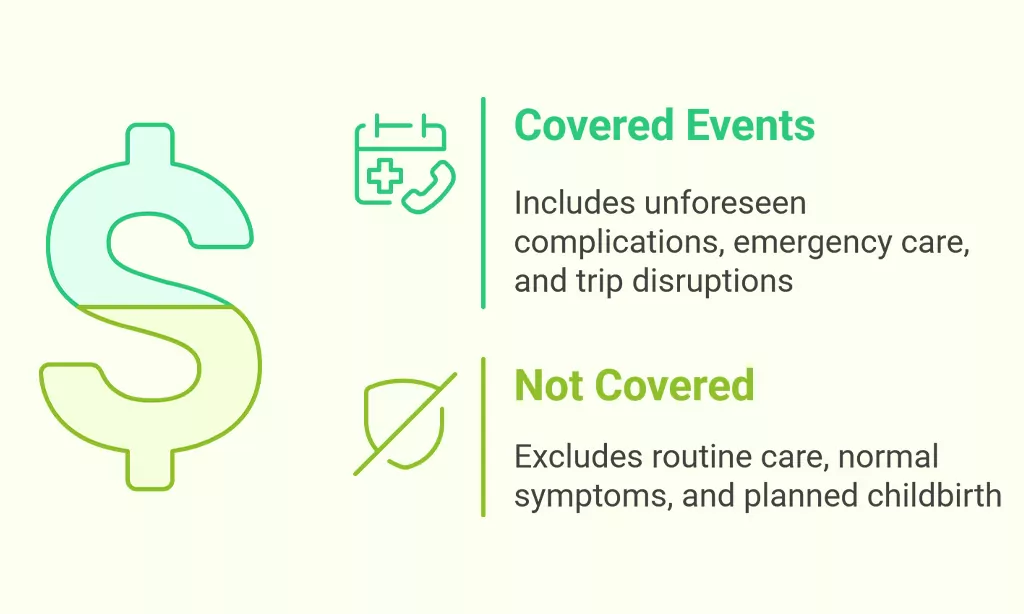Traveling while pregnant can be a joyful experience, but it also brings unique challenges and risks. One of the most pressing questions for expectant mothers is: will travel insurance cover pregnancy? This article provides an in-depth, expert-driven look at what pregnant travelers need to know about travel insurance, including what is typically covered, what isn’t, and how to choose the right policy for your needs. We’ll also share relevant statistics, expert advice, and practical tips to ensure you’re fully prepared for your journey.
Understanding the Basics: Will Travel Insurance Cover Pregnancy?
Travel insurance is designed to protect travelers from unexpected events that can disrupt their plans or cause financial loss. When it comes to pregnancy, coverage is nuanced:
- Normal pregnancy is generally not covered for trip cancellation or interruption if you already knew you were pregnant when purchasing the policy.
- Unexpected complications of pregnancy—such as pre-eclampsia, gestational diabetes, or severe morning sickness requiring hospitalization—are often covered, provided the complication is unforeseen and a doctor advises against travel.
- Routine care, childbirth, and care for a newborn are almost never covered under standard travel insurance policies.
- If you become pregnant after booking your trip and buying insurance, some policies may allow you to cancel and claim reimbursement, but you’ll need to provide medical documentation.
Why Is Pregnancy Travel Insurance Important?
Pregnancy brings a higher likelihood of medical emergencies, especially in unfamiliar environments. According to the CDC, pregnant travelers are at increased risk for certain travel-borne illnesses and complications. Having travel insurance tailored for pregnancy can provide:
- Financial protection for emergency medical care or evacuation.
- Reimbursement for trip cancellation or interruption due to unforeseen complications.
- Peace of mind so you can focus on enjoying your journey.
Incident in Focus: A Real-World Scenario
Imagine you’re in your second trimester and have planned a long-awaited babymoon abroad. A week before departure, you develop severe nausea and are hospitalized for hyperemesis gravidarum—a serious pregnancy complication. Your doctor advises you to cancel your trip. Will travel insurance cover pregnancy in this case? If you purchased a policy before your pregnancy or before the complication arose, and the policy includes coverage for unforeseen medical emergencies, you would likely be reimbursed for nonrefundable trip costs.
However, if you cancel simply because you’re in your third trimester or your doctor recommends rest as a precaution (without a diagnosed complication), most insurers will not cover your losses.
What Does Pregnancy Travel Insurance Typically Cover?

Covered Events
Most comprehensive travel insurance policies answer “will travel insurance cover pregnancy” with coverage for:
- Unforeseen pregnancy complications such as pre-eclampsia, gestational diabetes, hyperemesis gravidarum, ectopic pregnancy, placental abruption, and more.
- Emergency medical care if you experience a pregnancy-related complication while traveling.
- Emergency medical evacuation if you need to be transported to a facility with adequate maternity care.
- Trip cancellation or interruption if a doctor certifies you cannot travel due to a new, documented complication.
- Premature birth and emergency caesarean section (within policy gestational limits).
Not Covered
- Routine prenatal care (regular check-ups, ultrasounds, vitamins).
- Normal pregnancy symptoms (morning sickness, fatigue).
- Planned childbirth and newborn care (unless it is an emergency and within gestational coverage limits).
- Travel after a certain week of pregnancy (usually 24–28 weeks for single pregnancies; lower for multiples).
Detailed List: Pregnancy Complications Commonly Covered
| Complication | Typically Covered? | Notes |
| Ectopic pregnancy | Yes | Emergency only |
| Gestational hypertension | Yes | If diagnosed during travel |
| Pre-eclampsia | Yes | Must be documented by a physician |
| Hyperemesis gravidarum | Yes | Severe cases requiring hospitalization |
| Placental abruption | Yes | Emergency only |
| Premature birth | Yes | Only if more than 8 weeks before due date (16 for multiples) |
| Medically necessary C-section | Yes | If due to emergency |
| Routine childbirth | No | Not covered unless emergency and within gestational limits |
Real-World Scenarios

Scenario 1: Emergency Complication Abroad
A traveler at 23 weeks develops preeclampsia in Paris and is hospitalized. Her insurance covers emergency medical care, hospital stay, and neonatal care for the premature baby until they return home.
Scenario 2: Trip Cancellation Due to New Complication
A traveler’s doctor diagnoses her with a serious complication at 20 weeks, making travel unsafe. Insurance reimburses her for nonrefundable trip costs, provided the complication was unforeseen and certified by a doctor.
Scenario 3: Routine Pregnancy Cancellation
A traveler cancels a trip at 32 weeks due to general discomfort. Insurance does not reimburse her, as this is considered a normal progression of pregnancy.
How Far Along Can You Be and Still Get Coverage?
Gestational limits are crucial in answering “will travel insurance cover pregnancy”:
- Single pregnancies: Coverage up to 24–28 weeks is common.
- Multiple pregnancies: Coverage often ends at 24 weeks.
- Some insurers extend coverage up to 32 or even 36 weeks for uncomplicated pregnancies, but this is rare and may require additional screening.
Tip: Always check your policy’s gestational limit and inform your insurer of your pregnancy stage before traveling.
Special Considerations: IVF, Multiples, and Pre-existing Conditions
- IVF or assisted pregnancies: Some insurers require disclosure and may have stricter limits or exclusions.
- Multiple pregnancies: Lower gestational limits apply; coverage may end at 24 weeks.
- Pre-existing complications: May be excluded unless you obtain a pre-existing condition waiver.
“Cancel for Any Reason” (CFAR) Coverage
CFAR is an optional add-on that allows you to cancel your trip for any reason—not just covered complications. This can be especially helpful for pregnant travelers, but it usually only reimburses a portion (50–75%) of nonrefundable costs and must be purchased soon after your initial trip deposit.
How to Choose the Best Pregnancy Travel Insurance
Checklist for Choosing a Policy
- Medical coverage for pregnancy complications
- Emergency medical evacuation
- Trip cancellation/interruption (including for pregnancy complications)
- 24/7 assistance services
- Coverage for premature birth and neonatal care (if possible)
- Clear gestational limits
- Pre-existing condition waiver (if needed)
- CFAR option for extra flexibility
Questions to Ask Your Insurer
- Will travel insurance cover pregnancy complications at my current gestational week?
- Are IVF or multiple pregnancies covered?
- What documentation is needed for a claim?
- Are newborn medical costs covered if I deliver prematurely abroad?
- Are there exclusions for destinations with travel advisories or infectious disease risks?
Key Statistics and Data
- Gestational Coverage: Most policies cover up to 24–28 weeks for single pregnancies, 24 weeks for multiples.
- Premature Birth Risk: About 7.6% of live births in the US are preterm (<37 weeks), underscoring the need for coverage.
- Travel Insurance Claims: In a large US database, 79% of pregnancies resulted in live births, with 21% ending in miscarriage, abortion, or stillbirth.
- Travel During Pregnancy: The American College of Obstetricians and Gynecologists recommends the second trimester (14–28 weeks) as the safest time to travel.
Frequently Asked Questions
Is pregnancy a pre-existing condition?
Most insurers do not consider normal pregnancy a pre-existing condition, but complications or IVF pregnancies may require disclosure and special coverage.
Does travel insurance cover childbirth?
Routine childbirth is almost never covered. Only emergency or premature deliveries due to complications may be covered, and only up to the policy’s gestational limit.
What if I become pregnant after buying insurance?
If you become pregnant after purchasing your policy and a doctor advises against travel, some insurers may reimburse you for cancellation, but you’ll need medical documentation.
Do I need to tell my insurer I’m pregnant?
Yes. While pregnancy is not usually a pre-existing condition, you should inform your insurer to ensure you’re fully covered and to clarify any special conditions or complications.
Tips for Safe and Insured Travel While Pregnant
- Consult your doctor before booking travel.
- Buy insurance early—the sooner after booking your trip, the better your coverage window.
- Read the fine print—know your policy’s gestational limits and exclusions.
- Carry all necessary documents—insurance policy, emergency contacts, and maternity notes.
- Choose destinations with good medical facilities and avoid areas with high risks of infectious diseases (e.g., Zika, Malaria, Dengue).
- Pack smart—bring medications, prenatal vitamins, and comfort items for travel.
The Role of Marketing and Education
Insurers are increasingly offering customizable policies for expectant parents, with options for emergency delivery, prenatal care, and flexible cancellation. Educational content and transparent communication are essential for building trust with pregnant travelers, helping them understand exactly what “will travel insurance cover pregnancy” means for their unique situation.
Takeaways
The answer to “will travel insurance cover pregnancy” is nuanced:
- Routine, uncomplicated pregnancies are not covered for cancellation or interruption.
- Unexpected complications and emergencies are often covered, but only up to a certain gestational week and with the right documentation.
- Childbirth and newborn care are rarely covered unless it is an emergency and occurs within the policy’s covered gestational period.
- Careful policy selection and early purchase are vital to ensure you have the protection you need.
Traveling while pregnant can be safe and enjoyable with the right precautions and a comprehensive insurance plan tailored to your needs. Always ask your insurer directly: Will travel insurance cover pregnancy in my specific situation? Peace of mind is priceless for you and your growing family.
This guide is based on authoritative sources, including insurance providers, medical associations, and travel industry experts, to ensure accuracy and trustworthiness. For the most current policy details, always consult your insurer directly.





























